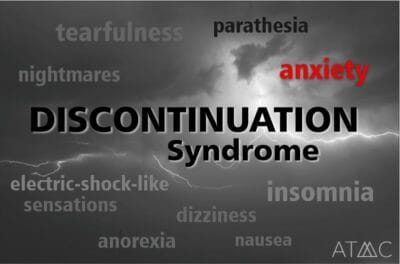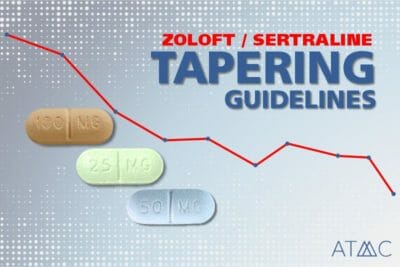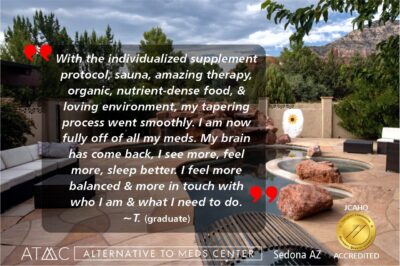1. Jefferies A L “Selective serotonin reuptake inhibitors in pregnancy and infant outcomes.” Canadian Paediatric Society [INTERNET] 2011 Nov 11 reaffirmed 2018 Feb 18 [cited 2022 July 6]
2. Yazdy MM, Mitchell AA, Louik C, Werler MM. Use of selective serotonin-reuptake inhibitors during pregnancy and the risk of clubfoot. Epidemiology. 2014 Nov;25(6):859-65. doi: 10.1097/EDE.0000000000000157. PMID: 25171134; PMCID: PMC4180776. [cited 2022 July 6]
3. MDs Wamsley, Byerley, McConnell, Dawson, Grosser “Receptor Alterations Associated With Serotonergic Agents: An Autoradiographic Analysis” Clinical Journal of Psychiatry, 1987 [cited 2022 July 6]
4. FDA Zoloft label [approval 1991] [cited 2022 July 6]
5. “Pregnant or Thinking of Getting Pregnant?” CDC Pregnancy Homepage (N.D.) [published online] [cited 2022 July 6]
6. FDA Drug Safety Communication, Zoloft [INTERNET] [cited 2022 July 6]
7. Kitaichi Y et al “Sertraline increases extracellular levels not only of serotonin, but also of dopamine in the nucleus accumbens and striatum of rats” PubMed, [INTERNET] 2010 Nov 10 [cited 2022 July 6]
8. EMC Patient Leafleft Sertraline [cited 2022 July 6]
9. Ryle PR, Thomson AD. Nutrition and vitamins in alcoholism. Contemp Issues Clin Biochem. 1984;1:188-224. PMID: 6400499. [cited 2022 July 6]
10. Haddad PM. Antidepressant discontinuation syndromes. Drug Saf. 2001;24(3):183-97. doi: 10.2165/00002018-200124030-00003. PMID: 11347722. [cited 2022 July 6]
11. Haddad P. Newer antidepressants and the discontinuation syndrome. J Clin Psychiatry. 1997;58 Suppl 7:17-21; discussion 22. PMID: 9219489. [cited 2022 July 6]
12. Glenmullen J, “The Antidepressant Solution- A Step-by-step Guide to Safely Overcoming Antidepressant Withdrawal, Dependence, and “addiction’” [book] published 2005 by Simon and Schuster ISBN 0743269721, 9780743269728 [cited 2022 July 6]
13. DeVane CL, Liston HL, Markowitz JS. Clinical pharmacokinetics of sertraline. Clin Pharmacokinet. 2002;41(15):1247-66. doi: 10.2165/00003088-200241150-00002. PMID: 12452737. [cited 2022 July 6]
14. Cecilie Hurup Munkboel, Lizette Weber Larsen, Johan Juhl Weisser, David Møbjerg Kristensen, Bjarne Styrishave, Sertraline Suppresses Testis and Adrenal Steroid Production and Steroidogenic Gene Expression While Increasing LH in Plasma of Male Rats Resulting in Compensatory Hypogonadism, Toxicological Sciences, Volume 163, Issue 2, June 2018, Pages 609–619, https://doi.org/10.1093/toxsci/kfy059 [cited 2022 July 6]
15. Barnhart WJ, Makela EH, Latocha MJ. SSRI-induced apathy syndrome: a clinical review. J Psychiatr Pract. 2004 May;10(3):196-9. doi: 10.1097/00131746-200405000-00010. PMID: 15330228. [cited 2022 July 6]
16. Informed Consent AMA Principles of Medical Ethics: I, II, V, VIII [cited 2022 July 6]
17. Levinson-Castiel, R., Merlob, P., Linder, N., Sirota, L. & Klinger, G. Neonatal abstinence syndrome after in utero exposure to selective serotonin reuptake inhibitors in term infants. Arch. pediatrics Adolesc. Med. 160, 173–176, https://doi.org/10.1001/archpedi.160.2.173 (2006). [cited 2022 July 6]
18. Reefhuis J, Devine O, Friedman JM, Louik C, Honein MA, and the National Birth Defects Prevention Study. Specific SSRIs and birth defects: bayesian analysis to interpret new data in the context of previous reports. BMJ. 2015 published online CDC Key Findings – A Closer Look at the Link Between Specific SSRIs and Birth Defects [cited 2022 July 6]
19. Prah A, Purg M, Stare J, Vianello R, Mavri J. How Monoamine Oxidase A Decomposes Serotonin: An Empirical Valence Bond Simulation of the Reactive Step. J Phys Chem B. 2020;124(38):8259-8265. doi:10.1021/acs.jpcb.0c06502 [cited 2022 July 6]
20. Singh HK, Saadabadi A. Sertraline. [Updated 2022 May 2]. In: StatPearls [Internet]. Treasure Island (FL): StatPearls Publishing; 2022 Jan-. Available from: https://www.ncbi.nlm.nih.gov/books/NBK547689/ [cited 2022 July 6]
21. Schmitt JA, Ramaekers JG, Kruizinga MJ, van Boxtel MP, Vuurman EF, Riedel WJ. Additional dopamine reuptake inhibition attenuates vigilance impairment induced by serotonin reuptake inhibition in man. J Psychopharmacol. 2002 Sep;16(3):207-14. doi: 10.1177/026988110201600303. PMID: 12236626. [cited 2022 July 6]
22. Ahrold TK, Meston CM. Effects of SNS activation on SSRI-induced … effects differ by SSRI. J Sex Marital Ther. 2009;35(4):311-9. doi: 10.1080/00926230902851322. PMID: 19466669; PMCID: PMC4426856. [cited 2022 July 6]
23. Mitchell AA, Gilboa SM, Werler MM, Kelley KE, Louik C, Hernandez-Diaz S, and the National Birth Defects Prevention Study. Medication use during pregnancy, with particular focus on prescription drugs: 1976-2008. Am J Obstet Gynecol. 2011;205(1):51.e1-8. [cited 2022 July 6]
24. Moncrieff, J., Cooper, R.E., Stockmann, T. et al. The serotonin theory of depression: a systematic umbrella review of the evidence. Mol Psychiatry (2022). [cited 2023 Feb 13]
25. Goldman R, Montagne M. Marketing ‘mind mechanics’: decoding antidepressant drug advertisements. Soc Sci Med. 1986;22(10):1047-58. doi: 10.1016/0277-9536(86)90205-4. PMID: 2426792. [cited 2023 Feb 13]
26. FDA label Prozac [cited 2023 Feb 13]
27. FDA label Celexa [cited 2023 Feb 13]
28. Harmer CJ, Duman RS, Cowen PJ. How do antidepressants work? New perspectives for refining future treatment approaches. Lancet Psychiatry. 2017 May;4(5):409-418. doi: 10.1016/S2215-0366(17)30015-9. Epub 2017 Jan 31. PMID: 28153641; PMCID: PMC5410405. [cited 2023 Feb 14]
29. LaChance LR, Ramsey D. Antidepressant foods: An evidence-based nutrient profiling system for depression. World J Psychiatry. 2018 Sep 20;8(3):97-104. doi: 10.5498/wjp.v8.i3.97. PMID: 30254980; PMCID: PMC6147775. [cited 2023 Feb 14]
30. Sarris J, Ravindran A, Yatham LN, Marx W, Rucklidge JJ, McIntyre RS, Akhondzadeh S, Benedetti F, Caneo C, Cramer H, Cribb L, de Manincor M, Dean O, Deslandes AC, Freeman MP, Gangadhar B, Harvey BH, Kasper S, Lake J, Lopresti A, Lu L, Metri NJ, Mischoulon D, Ng CH, Nishi D, Rahimi R, Seedat S, Sinclair J, Su KP, Zhang ZJ, Berk M. Clinician guidelines for the treatment of psychiatric disorders with nutraceuticals and phytoceuticals: The World Federation of Societies of Biological Psychiatry (WFSBP) and Canadian Network for Mood and Anxiety Treatments (CANMAT) Taskforce. World J Biol Psychiatry. 2022 Jul;23(6):424-455. doi: 10.1080/15622975.2021.2013041. Epub 2022 Mar 21. PMID: 35311615. [cited 2023 Feb 14]
31. Sarris J, Panossian A, Schweitzer I, Stough C, Scholey A. Herbal medicine for depression, anxiety and insomnia: a review of psychopharmacology and clinical evidence. Eur Neuropsychopharmacol. 2011 Dec;21(12):841-60. doi: 10.1016/j.euroneuro.2011.04.002. Epub 2011 May 23. PMID: 21601431. [cited 2023 Feb 14]

 There is a lot that remains unknown about how SSRIs “work” — but what can be said is, whether starting on or stopping Zoloft, the way serotonin is distributed in the body will be affected. SSRI drugs accelerate how quickly any available serotonin gets used up. The temporary concentration of serotonin becoming suspended at the nerve synapses is what is believed to create a lift in tone, hence the term “antidepressants.” But this process is also likely to ultimately leave a deficit of your body’s natural neurochemicals in its wake. Serotonin, when suspended by an SSRI, is subject to degradation and decomposition by certain enzymes in the bloodstream, and this results in accelerated serotonin loss overall.19 This could be likened to the way alcohol impairs the uptake and metabolism of certain nutrients, leaving a deficiency in its wake. The next day, these impairments and created deficits contribute to the misery that is most often referred to as a “hangover.” Zoloft also affects various natural chemicals in similar ways, such as norepinephrine and dopamine — these are targeted to a lesser extent, but the likelihood of deficiency is similar.9,20
There is a lot that remains unknown about how SSRIs “work” — but what can be said is, whether starting on or stopping Zoloft, the way serotonin is distributed in the body will be affected. SSRI drugs accelerate how quickly any available serotonin gets used up. The temporary concentration of serotonin becoming suspended at the nerve synapses is what is believed to create a lift in tone, hence the term “antidepressants.” But this process is also likely to ultimately leave a deficit of your body’s natural neurochemicals in its wake. Serotonin, when suspended by an SSRI, is subject to degradation and decomposition by certain enzymes in the bloodstream, and this results in accelerated serotonin loss overall.19 This could be likened to the way alcohol impairs the uptake and metabolism of certain nutrients, leaving a deficiency in its wake. The next day, these impairments and created deficits contribute to the misery that is most often referred to as a “hangover.” Zoloft also affects various natural chemicals in similar ways, such as norepinephrine and dopamine — these are targeted to a lesser extent, but the likelihood of deficiency is similar.9,20 Zoloft discontinuation syndrome has been studied minimally in clinical trials, especially in light of the fact that SSRI medications are so widely prescribed. Outside of limited clinical trials and a prevalence of anecdotal reporting, very little research has been done on the problems encountered with Zoloft tapering.10 However, there is some consensus that abrupt dose reduction can generate intense and long-lasting adverse reactions. This is sometimes misdiagnosed as a relapse.11 This can, in turn, lead to further mismanagement of the condition.
Zoloft discontinuation syndrome has been studied minimally in clinical trials, especially in light of the fact that SSRI medications are so widely prescribed. Outside of limited clinical trials and a prevalence of anecdotal reporting, very little research has been done on the problems encountered with Zoloft tapering.10 However, there is some consensus that abrupt dose reduction can generate intense and long-lasting adverse reactions. This is sometimes misdiagnosed as a relapse.11 This can, in turn, lead to further mismanagement of the condition. The FDA recommends gradual reduction, not stopping abruptly.4
The FDA recommends gradual reduction, not stopping abruptly.4 Women who are considering starting Zoloft or other SSRI-type medication may not always be informed of the 3-5% increased risk of birth defects compared to placebo according to trials that have been done.1 An infant born to a mother taking Zoloft may suffer profound adverse reactions in addition to the risks of various birth defects.17 Again, to avoid these complications and risks, we would advise considering Zoloft tapering before one becomes pregnant, both for the future health of the baby and the health of the mother.
Women who are considering starting Zoloft or other SSRI-type medication may not always be informed of the 3-5% increased risk of birth defects compared to placebo according to trials that have been done.1 An infant born to a mother taking Zoloft may suffer profound adverse reactions in addition to the risks of various birth defects.17 Again, to avoid these complications and risks, we would advise considering Zoloft tapering before one becomes pregnant, both for the future health of the baby and the health of the mother. SSRIs like Zoloft (sertraline) are endocrine-disruptive as demonstrated in rat studies.14 These effects are thought to explain the sexual dysfunction linked to such medications. The neuroadaptive capabilities of the CNS are geared to attempt to normalize despite the drug-induced flooding of serotonin into the nervous system. Antidepressant patients can develop chronic apathy and worsened depression after long-term use of SSRIs. This is not a mental illness returning; this is the possible effect that serotonergic medications have on the human body. This antidepressant-induced apathy creates “zombie-like” or deadened feelings. Clinicians sometimes refer to the effect as “SSRI-induced indifference” or “SSRI-induced apathy.”15 Elderly patients with dementia are particularly susceptible to antidepressant-induced chronic apathy.3
SSRIs like Zoloft (sertraline) are endocrine-disruptive as demonstrated in rat studies.14 These effects are thought to explain the sexual dysfunction linked to such medications. The neuroadaptive capabilities of the CNS are geared to attempt to normalize despite the drug-induced flooding of serotonin into the nervous system. Antidepressant patients can develop chronic apathy and worsened depression after long-term use of SSRIs. This is not a mental illness returning; this is the possible effect that serotonergic medications have on the human body. This antidepressant-induced apathy creates “zombie-like” or deadened feelings. Clinicians sometimes refer to the effect as “SSRI-induced indifference” or “SSRI-induced apathy.”15 Elderly patients with dementia are particularly susceptible to antidepressant-induced chronic apathy.3 Our Zoloft tapering programs are designed to mitigate or completely eliminate the most difficult of outcomes you may be experiencing, or that you are worried may occur. There are many actions that we deliver to prepare such as
Our Zoloft tapering programs are designed to mitigate or completely eliminate the most difficult of outcomes you may be experiencing, or that you are worried may occur. There are many actions that we deliver to prepare such as 








